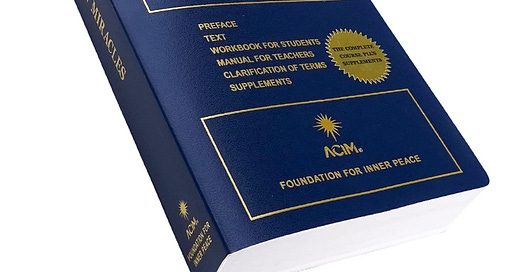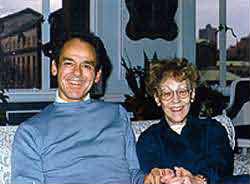What is A Course in Miracles?
In a nutshell, A Course in Miracles is a self-study metaphysical thought system unique in teaching forgiveness as the road to inner peace and the remembrance of the unconditional love of God. A Course in Miracles came about around the 1960s with the sudden decision of two people to join in a common goal. Helen Schucman and William Thetford, Professors of Medical Psychology at Columbia University's College of Physicians and Surgeons in New York City, were anything but spiritual.
Their relationship with each other was difficult and often strained. But one day, they had concluded that, 'there must be another way' and given the "little willingness" to be helped. Not long after, A Course in Miracles was dictated to Helen by J (aka Jesus or Jeshua) over a period of 7 years in a kind of rapid, inner dictation. The result is a teaching device, consisting of three books: a 622-page Text, a 478-page Workbook for Students, and an 88-page Manual for Teachers.
From acim.org:
It makes a fundamental distinction between the real and the unreal; between knowledge and perception. Knowledge is truth, under one law, the law of love or God. Truth is unalterable, eternal, and unambiguous. It can be unrecognized, but it cannot be changed. It applies to everything that God created, and only what He created is real. It is beyond learning because it is beyond time and process. It has no opposite; no beginning and no end. It merely is.
The world of perception, on the other hand, is the world of time, of change, of beginnings and endings. It is based on interpretation, not on facts. It is the world of birth and death, founded on the belief in scarcity, loss, separation, and death. It is learned rather than given, selective in its perceptual emphases, unstable in its functioning, and inaccurate in its interpretations.
From knowledge and perception respectively, two distinct thought systems arise which are opposite in every respect. In the realm of knowledge no thoughts exist apart from God, because God and His Creation share one Will. The world of perception, however, is made by the belief in opposites and separate wills, in perpetual conflict with each other and with God. What perception sees and hears appears to be real because it permits into awareness only what conforms to the wishes of the perceiver. This leads to a world of illusions, a world which needs constant defense precisely because it is not real.
…
However, in this world, forgiveness is a necessary correction for all the mistakes that we have made. To offer forgiveness is the only way for us to have it, for it reflects the law of Heaven that giving and receiving are the same. Heaven is the natural state of all the Sons of God as He created them. Such is their reality forever. It has not changed because it has been forgotten.
Forgiveness is the means by which we will remember. Through forgiveness the thinking of the world is reversed. The forgiven world becomes the gate of Heaven, because by its mercy we can at last forgive ourselves. Holding no one prisoner to guilt, we become free. Acknowledging Christ in all our brothers, we recognize His Presence in ourselves. Forgetting all our misperceptions, and with nothing from the past to hold us back, we can remember God. Beyond this, learning cannot go. When we are ready, God Himself will take the final step in our return to Him.
Our entire universe is thus a dream, regardless of its levels or forms. True oneness means we were never separated from God in the first place. We are still one with God all along. It only took place in a tiny mad instant when the Son of God (that’s us) had a delusional dream that we could be separated from ourselves in the reality of God.
It is in this split moment when consciousness was conceived and illusively divided the One of us into the individual bodies or existence we are now thinking ourselves to be. Just like our dreams in sleep, a dream is ultimately unreal. When we wake up, it is gone.
The way to break out of this cycle of life and death, as the Course suggests, is the practice of true forgiveness. It differs from the usual forgiveness process we understand. Typical forgiveness is such that we think other people are the source of our problems and then we hypocritically forgive them by perhaps thinking that we are better than them. However, we are only forgiving the effect (our projection) and not the cause (the decision to perceive separation).
True forgiveness is to understand that it is all a dream, there is no world, and nothing has ever happened. We are merely making up this world and projecting our unconscious guilt on other bodies so that they become the guilty ones. He is guilty, not me. Now I don’t have to remember that there is ultimately only one source of guilt (now unconscious) stemming from the decision to be separated from God. It also reinforces the false notion that we are separated individuals and keeps us identified with our body, which we are not in reality.
But if nothing has really happened and it is unreal, we are all guiltless and it is by healing this unconscious guilt of separation from God with true forgiveness that we can eventually undo the ego (the part of our mind which believes in separation) and experience the reality of God again.





